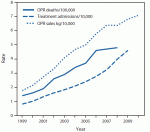- Joined
- Mar 7, 2011
- Messages
- 44,814
- Reaction score
- 20,221
- Location
- A very blue state
- Gender
- Male
- Political Leaning
- Independent
There is much theorizing on the chemical cause of depression...but Ive yet to meet the person that loves themselves, is in a powerful and positive loving relationship, had a strong supportive relationship with their family, did not experience trauma, loves their life today and is excited about their life tomorrow that still suffers from depression. Not saying that person doesnt exist...but that I've never met that person. Which is odd if depression is due to faulty brain chemistry because that should be the case in a significant number of patients. IF that is the cause.
Depression is most often the bi-product of Crappy Life Syndrome. If yesterday sucked, and today sucks, and tomorrow looks a lot like yesterday and today...well...THATS depressing. People in that circumstance SHOULD be depressed. And yes...their brain chemistry would absolutely reflect state...but not cause.
Well, you kind of know me. My life is looking up in certain ways, I generally see good things coming...until the depression kicks in again.

